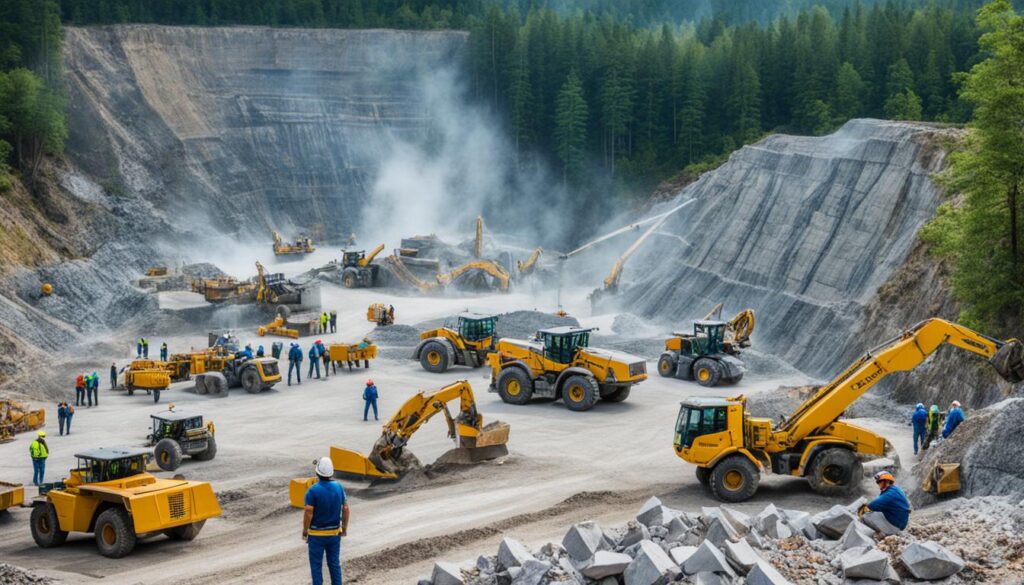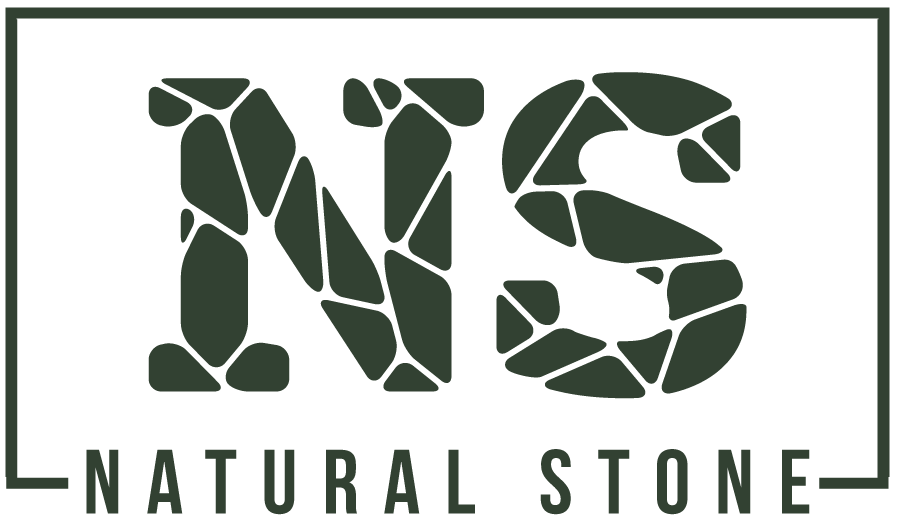Ethical Natural Stone Suppliers: Your Guide
In today’s world, the spotlight on Ethical and Sustainable Natural Stone Suppliers, eco-friendly stone suppliers, and green stone suppliers is getting brighter. Many businesses are now making sure their supply chains follow good practices for both people and the planet. A prime example is the work in Rajasthan to guide companies towards ethical sourcing, which involves many businesses working together.
The idea of sourcing natural stones ethically is very important. Most colored gemstones come from small, local mines. This means they usually have a smaller negative impact on the environment than big diamond mines. Also, getting these gemstones from the mine to the hands of jewelry makers involves many people. Take Moyo Gems in Africa, for instance. They show us how paying fair wages changes lives for the better.
Key Takeaways
- Ethical and Sustainable Natural Stone Suppliers are playing a key role in supply chains worldwide.
- Most colored gemstones come from small, local mines.
- By being ethical, these gemstone programs can make a big difference for miners.
- Many in the industry are working together to tackle challenges like human rights and the environment.
- There’s lots of help out there for businesses to do ethical sourcing right.
Introduction to Ethical Natural Stone Suppliers
Ethical sourcing in the natural stone industry means getting materials the right way. It respects people’s rights, follows labor laws, and protects the environment. This is key for sustainable stone suppliers. They make sure extraction and processing methods are responsible. In countries like India, ethical stone suppliers check their work doesn’t harm workers or nature. With these efforts, ethical building materials have become more popular.
To be ethical, stone suppliers must do a few things right. They focus on fair jobs, taking care of the planet, and helping local communities. They follow strict rules and get certifications. This shows they are serious about being green. Places like the Natural Stone Institute help suppliers improve. They help with the CEU program and Natural Stone University. These teach about handling slabs safely and avoiding diseases like silicosis.
Working together across countries is big in the ethical stone trade. In the UK, they help local and Indian businesses do better. This teamwork involves many groups including businesses, non-profits, unions, and governments. They tackle big problems and make sure imported stone is ethical.
Recognitions and events show how important it is to source stone ethically. For example, the 2023 Grande Pinnacle award celebrates being great at being green in the stone world. Future events, like the 2024 Quarry Safety Meeting and the Wisconsin Stone Summit, continue to push for learning and safety. Every year, there’s a David Fell Spirit of Service Award. It honors those who help a lot with ethical sourcing of natural stone.
“Ethical sourcing is not just a responsible choice but a strategic one that enhances reputation and ensures long-term sustainability.”
Why Ethical Sourcing is Important for Natural Stone Suppliers
Ethical sourcing in the natural stone industry is more important than ever. Companies are seeing the big benefits of making sure their stones are sourced ethically. This practice helps them reduce risks and make their business better.
The Rise of Ethical Sourcing in the Stone Industry
About 68% of the UK’s imported stone comes from Asia. India is the biggest source. There has been a lot of talk about bad working conditions in Indian quarries. This has pushed the need for sourcing stone in ethical ways. Doing so helps stone suppliers keep their good name and win more customers.
Human Rights and Labor Standards
Looking out for human rights and good work conditions is key. Companies that do this avoid bad reputation and legal problems. For example, UK brands can use a guide to help their Indian suppliers with labor standards. There is a lot of focus on making working conditions across the stone industry fairer. This is very important.
Environmental Impact and Sustainability
Being good to the environment is a must. It means using methods that are good for the land and that do not harm nature. Supporting eco-friendly practices helps the environment recover. It also makes customers trust stone suppliers more. There are third-party groups that check and approve stones that are sourced in ethical ways.
| Benefits of Ethical Sourcing | Key Factors |
|---|---|
| Reputation Management | Maintaining positive brand image through ethical practices |
| Market Share Increase | Gaining competitive advantage by offering ethically sourced products |
| Environmental Sustainability | Implementing eco-friendly practices in sourcing and production |
| Human Rights Support | Ensuring fair labor conditions and improving worker welfare |
How to Identify Ethical and Sustainable Natural Stone Suppliers
To find ethical and sustainable natural stone suppliers, look at certifications and transparency. Businesses that focus on these areas can help the ethical sourcing cause. By checking for ethical certifications, keeping the stone’s journey clear, and auditing suppliers, you can make a difference.
Certifications and Standards
Certifications are key in spotting ethical suppliers. You should search for certifications that show a supplier is following ethical labor and environmental rules. The Natural Stone Institute and the Marble Institute of America are good places to look for these. These certifications confirm that the stones were gotten and processed responsibly.
Transparency in Supply Chains
Seeing where stones come from is vital for ethical practices. But often, stones change many hands, making their origin hard to trace. Transparent supply chains help connect each stone to its mine, boosting trust in ethical practices. The U.S., Canada, and Australia are known for following strict labor and environmental rules, making them good models for transparency.
Supplier Audits and Assessments
To make sure suppliers keep up ethical standards, regular checks are needed. These audits see if suppliers meet certification requirements. Suppliers are rated on how well they follow the rules and on the benefits they bring to communities. For instance, Moyo Gems in Africa improves the lives of female miners significantly by paying them better.
Businesses wanting to support ethical sourcing should pick the right suppliers. They need to ask deep questions about where the stones come from and check them thoroughly. This, coupled with looking for reputable certifications, ensures responsible and clear supply chains.
Criteria for Selecting Ethical and Sustainable Natural Stone Suppliers
Choosing the best natural stone supplier is key, especially with ethical and sustainable concerns. You need to look at several factors to make a responsible choice. Here’s what to consider:
Fair Labor Practices
It all starts with fair labor practices. This means making sure workers have safe jobs, get paid well, and their rights are protected. Places like the Moyo Gems project in Africa show how treating workers well benefits everyone. They pay their miners much more than usual. This helps uplift their whole community.
Environmental Responsibility
When it comes to the environment and stone sourcing, it’s about being careful. The goal is to mine stones without hurting nature too much. Did you know that most colored gemstones come from small, local operations? This kind of mining is usually better for the land and the people nearby. Countries like the U.S., Canada, and Australia have strict rules for ethical mining.
Community Engagement and Support
Working with local communities is also crucial. It means helping the people living there and saving the environment. When projects support the area, everyone wins. This can make life better for the local people and help the community grow.
| Criteria | Details |
|---|---|
| Fair Labor Practices | Safe working conditions, fair wages, upholding worker rights. |
| Environmental Responsibility | Adherence to sustainable practices, minimizing ecological disruption. |
| Community Engagement and Support | Support local initiatives, engage with and benefit local populations. |
To find sustainable stone sources, choose those who care about ethics and the environment. These suppliers focus on doing good for the people and the planet. They provide quality materials while supporting the wider community.
The Business Case for Ethical Sourcing in Stone Supply Chains
Using ethical practices in the stone industry brings big benefits. It’s more than just meeting the law. By making work conditions better and having fair labor, companies do better in buying stones.
One key benefit is managing how people see your brand. Companies like Beltrami and London Stone got ahead by joining Ethical Trading. They’ve earned trust, good press, and loyalty because they choose ethical sourcing.
Also, being ethical gives a real edge. People who love the care companies show buy more from them. The UK’s work on human rights in 2013 shows the power of doing the right thing.
Ethical choices can also save money. It might cost more at first to do things right, but less after that. That’s because there’s less risk of factory issues and you get better products. In the UK, most stones come from Asia and India.
Making life better for workers helps a company’s employees too. Happy workers bring more to work, stay longer, and work better. Projects like Moyo Gems, which pays miners better, show how everyone wins with ethical sourcing.
Choosing ethical practices not only makes a company do right, but also gives business boosts. These help their chain of supply stay strong and ensure they succeed in the long term.
| Benefit | Impact |
|---|---|
| Reputational Management | Strengthened market position and increased consumer trust |
| Competitive Advantage | Attracts conscientious consumers, leading to higher sales |
| Cost Savings | Long-term savings due to reduced labor disputes and stable supply chains |
| Human Resources Management | Improved employee morale, retention, and productivity |
Challenges and Opportunities in Ethical Sourcing of Natural Stones
Today, many companies in the stone industry work hard to source ethically. They face challenges like complex supply chains and following many labor laws. Yet, these obstacles offer chances to do better and grow.

Common Challenges Faced
One big problem is the complex supply chain. For example, gemstones can pass through 10-15 hands before a Jewelry Designer uses them. This makes finding out where each stone comes from hard, which makes being open about it tough. In addition, 70% of colored gemstones come from small, artisinal mines. Even though these mines are better for the environment, making sure they work ethically is hard.
Opportunities for Improvement and Growth
Despite the challenges, there is a lot of room for the stone industry to grow ethically. By working together, the industry can create better standards. It can learn from places like the U.S., Canada, and Australia that have strict laws. These laws have made them known for getting their stones ethically. For instance, Moyo Gems in Africa creates a fair work environment. They pay female miners well and ensure their stones are traceable.
Ethically sourced gemstones might cost more because of fair work and care for the environment. But, this is a chance for jewelers to stand out. They can tell the story of how their stones are sourced the right way. This appeals to more and more careful customers. Plus, coming up with new ethical sourcing methods is a big chance for progress.
Dealing with the challenges in ethical stone sourcing and using the chances for growth in sustainable stone industry can really change things. It can lead to a supply chain that is ethical and clear, from the mine to the store.
Case Studies: Leading Ethical Natural Stone Suppliers
In today’s world, many companies are leading the charge in ethical sourcing of natural stones. They work together with others to raise labor standards and to protect the environment.
Profiles of Top Suppliers
Companies like Marshalls, Beltrami, and Brett are setting new standards. Marshalls has been a leader in supporting better human rights in supply chains. It has followed UN principles since 2009. They publish a report on modern slavery risks every year since 2018. They also meet the Ethical Labour Sourcing Standard
(BES 6001) every year.
Beltrami and Brett are also working hard. They are part of a special group focused on ethical sourcing of sandstone from India. By working with experts, they ensure better practices.
Success Stories and Best Practices
Companies leading in ethical sourcing are making real change. For example, they’ve helped make the conditions in quarries in India better. This not only helps people but also makes their own businesses stronger.
One excellent approach is the Ethical Trading Initiative. It includes companies, unions, and NGOs. They give advice on how to ethically source stones from India, among other places.
One country leading the way in ethical business practices is the UK. Since September 2013, it has been working to make sure businesses think about people’s rights in all they do.
Also, awards like the 2023 Grande Pinnacle from the Natural Stone Institute highlight good work. The Institute also holds events to teach others how to work sustainably.
Ethical and Sustainable Natural Stone Suppliers: A Comprehensive Guide
This detailed guide is crucial for those wanting to use ethical methods in the stone industry. It shows how to deal with complex supply chains. And, it shares steps to ensure sourcing is transparent and responsible.
Overview of the Comprehensive Guide
It’s a key resource for UK importers and Indian stone suppliers. It focuses on ethical sourcing, which means looking out for worker rights and the environment. It shines a light on good efforts, like Moyo Gems, who pay fair wages.
Steps to Implementing Ethical Sourcing
Being ethical in the stone world takes hard work. The guide offers key steps to help suppliers and buyers reach ethical sourcing:
- Define Corporate Goals: Set clear ethical targets tied to your company’s aim.
- Supplier Transparency: Make sure you can track where each stone comes from. This deals with the industry’s complicated supply chain.
- Labor Risk Management: Find and fix labor risks by sticking to tight labor rules.
- Regular Audits: Check on things often to keep up with ethical standards.
- Community and Environmental Focus: Help local areas and lower harm on the planet.
Resources and Tools for Suppliers and Buyers
The guide also offers help for keeping up with labor rules and taking care of the environment:
- Checklists: Handy lists to ensure you’re following ethical rules and making progress.
- Toolkits: Special packs that help businesses with the best ways to care for workers and the planet.
- Educational Materials: Stuff to keep everyone up to date on what’s new in ethical sourcing.
Using these resources helps companies put solid ethical sourcing plans into action. This guide highlights how working together can make the stone industry more honest, ethical, and sustainable. If you’re upping your company’s ethical game or managing labor risks, this guide to sustainable stone is essential. It will support you in using ethical methods in the stone business.
Impact of Ethical Sourcing on the Natural Stone Market
Ethical sourcing is making big changes in the natural stone market. It’s changing what customers want and how companies work. Social and environmental concerns are now key for those buying and selling natural stone.
This shift is pushing the stone industry towards sustainability. Companies are changing how they do business, working closer with communities worldwide.

Market Trends and Consumer Demand
About 70% of the world’s colored gemstones come from small-scale mines. This is usually better for the environment and communities than big diamond mines. These mines help local people make a living.
But, the journey of a gemstone from where it’s found to when it’s designed into jewelry can be long and complex. It might pass through 10 to 15 people’s hands. The U.S., Canada, and Australia are known for their strict laws that support ethical gem mining.
Now, more people want stones that are sourced responsibly. They’re willing to pay more for this. For example, a Certified Solitaire Diamond Engagement Ring in 18k White Gold can cost up to £41,397.00. The allure is clear – knowing it’s good for the planet and the people who mine it makes these items stand out.
Long-term Benefits for Companies and Communities
Choosing to source ethically comes with many rewards. It helps with legal issues and protects a company’s image right away. Down the line, it can boost market share and the company’s value. Even though it costs more to mine gemstones ethically and sustainably, it wins over buyers who value fairness and earth-friendly practices.
Additionally, ethical practices better the lives of the supply chain workers. There are over 100 million people in the jewelry business, often in poor parts of the world. Ethical sourcing means better pay and safer, healthier work environments. It also fights against child labor and trafficking.
The jewelry industry can be tough on the planet, too. For example, mining one carat of gold creates 57 kg of carbon. Ethical sourcing aims to lessen these harmful effects. It pushes for mining that doesn’t damage the earth as much.
How Consumers Can Support Ethical Natural Stone Suppliers
There are over 100 million people working in the jewelry industry worldwide. Many of them work in poor areas. Consumers play a big part in pushing for ethical gemstone jewelry. They can do this by asking for clear information about where the stones come from. This helps improve how things are done across the whole industry.
Mining has big effects on people and the planet. In the jewelry business, mining can involve illegal activities and harm to workers. This includes children working in dangerous conditions and workers in South Africa facing high risks. Plus, mining harms the environment, like releasing a lot of carbon. It’s also bad for forests, with large parts of the Amazon being cut down.
- Environmental Impact: Mining activities pollute water sources and affect agricultural and aquatic life, while also causing noise pollution and loss of local vegetation.
- Human Rights: Consumers should be aware that approximately one million children work in hazardous conditions in mining operations, leading to health issues and exploitation.
- Transparency: Supporting ethical stone supply chains involves choosing suppliers who offer clear information about the origin and journey of their stones.
| Impact | Statistics |
|---|---|
| Children Working in Mining | 1 Million |
| Mortality Rate in South African Mines | 20% Higher |
| Carbon Released per Carat of Gold | 57 kg |
| Amazon Deforestation (2005-2015) | 4,500 Square Miles |
To support ethical gemstone jewelry, consumers should ask where their stones come from. Choosing suppliers who focus on being ethical is a great step. Many sellers are now working to offer gems produced and sourced responsibly. This is because customers are looking for sustainable options more and more. Groups like the Responsible Jewellery Council work hard to define and promote good practices. Their efforts make ethical gemstone jewelry more available and appealing.
Conclusion
The ethical sourcing of natural stone is becoming more important. This is driven by increased consumer awareness and global demand for responsible jewelry. The practice is guided by the industry’s efforts in collaboration and the creation of comprehensive guides on best practices. As more people choose ethical sourcing, the industry’s standards rise. This pushes it towards more sustainable and responsible sourcing around the world.
Ethical diamond sourcing helps the environment and improves product value. Companies like Madhav Marbles and Granite Ltd and Quality Stone Veneer set good examples. They focus on fair labor and reducing harm to the environment. Their work shows how industry leaders make a positive impact.
The conscious consumer is a key player in driving industry change. By asking for transparency and ethical practices, consumers are making a difference. The trend towards ethical sourcing is growing. This signals that the future of the natural stone market is in sustainability and ethical labor. Together, suppliers and consumers uphold these values, moving towards a more responsible and eco-friendly industry.



